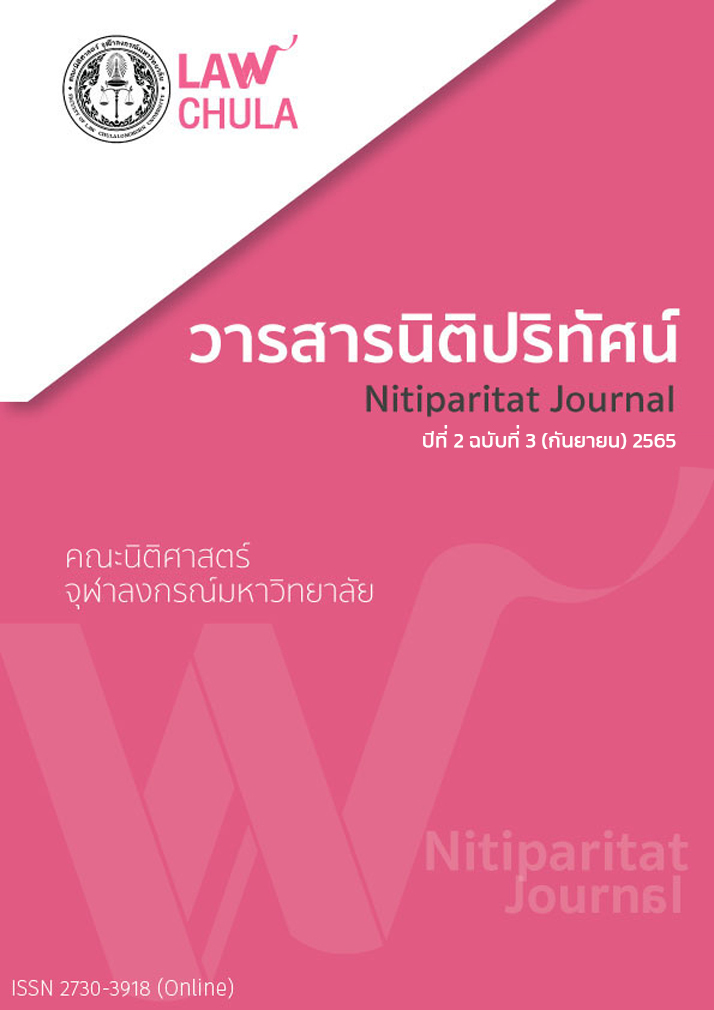การจำกัดเสรีภาพสื่อระหว่างการบริหารราชการในสถานการณ์ฉุกเฉินโควิด-19 ของประเทศไทย: เพื่อความมั่นคงของชาติหรือปิดปากประชาชน
คำสำคัญ:
สื่อ, เสรีภาพ, สถานการณ์ฉุกเฉินบทคัดย่อ
บทบาทสำคัญประการหนึ่งของสื่อมวลชนคือการนำเสนอความจริง ไม่ว่าจะเป็นสถานการณ์ที่เกิดขึ้นภายในหรือภายนอกประเทศ ติดตามการทำงานของรัฐบาล และสะท้อนเสียงประชาชน เสรีภาพของสื่อมวลชนจึงได้การรับรองด้วยการบัญญัติไว้ในรัฐธรรมนูญของหลายประเทศทั่วโลกที่ปกครองด้วยระบอบประชาธิปไตย และยังได้รับการบัญญัติไว้ในปฏิญญาสากลว่าด้วยสิทธิมนุษยชนและกติการะหว่างประเทศว่าด้วยสิทธิพลเมืองและสิทธิทางการเมือง นายกรัฐมนตรีได้ประกาศใช้พระราชกำหนดการบริหารราชการในสถานการณ์ฉุกเฉิน พ.ศ.2548 (พ.ร.ก. ฉุกเฉินฯ) เพื่อควบคุมสถานการณ์การระบาดของโรคไข้หวัดใหญ่สายพันธุ์ใหม่ 2019 (Covid-19) โดยมีผลบังคับใช้ตั้งแต่วันที่ 26 มีนาคม 2563 รัฐบาลได้ออกข้อกำหนดเพื่อควบคุมสื่อโดยใช้อำนาจตามมาตรา 9 แห่ง พ.ร.ก.ฉุกเฉินฯ มาตรการดังกล่าวมีผลลดทอนเสรีภาพสื่อและจำกัดการทำงานของสื่อมวลชน บทความจึงมีวัตถุประสงค์จะทบทวนแนวคิดทฤษฎีเรื่องเสรีภาพของสื่อมวลชน ปฏิญญาสากลและกติการะหว่างประเทศที่เกี่ยวข้องกับเสรีภาพของสื่อ กฎหมายที่เกี่ยวข้องกับสิทธิเสรีภาพสื่อของประเทศไทยที่สำคัญ วิพากษ์วิจารณ์มาตรการการควบคุมสื่อในการบริหารราชการในสถานการณ์ฉุกเฉิน Covid-19 ของประเทศไทยทั้งแง่แนวคิดทฤษฎีเรื่องเสรีภาพของสื่อมวลชนที่นำมาใช้ ข้อขัดแย้งกับรัฐธรรมนูญ กติกาและปฏิญญาสากล และหลักนิติรัฐ/นิติธรรม รวมทั้งแสดงความคิดเห็น ข้อเสนอแนะและแนวทางการแก้ปัญหาต่อการใช้อำนาจรัฐในสถานการณ์ฉุกเฉินเพื่อควบคุมสื่อ
เอกสารอ้างอิง
ประกาศ เรื่อง การขยายระยะเวลาการประกาศสถานการณ์ฉุกเฉินในทุกเขตท้องที่ทั่วราชอาณาจักร (คราวที่ 18). ราชกิจจานุเบกษา. เล่ม 139 ตอนพิเศษ 118 วันที่ 26 พฤษภาคม 2565
นันทนา นันทวโรภาส. การสื่อสารทางการเมืองในประชาคมอาเซียน. วารสารร่มพฤกษ์ มหาวิทยาลัยเกริก ปีที่ 32 ฉบับที่ 3 มิถุนายน - กันยายน 2557. หน้า 133-153
Oluwasola O. The Normative Theories of the Press in the Digital Age: A Need for Revision. SSRN Electronic Journal. 2020.
นรณฏฐ ไชยคำ แนวคิดทฤษฎีและงานวิจัยที่เกี่ยวข้อง. ใน นรณฏฐ ไชยคำ. 2555. บทบาทของรัฐบาลในการกำกับสื่อมวลชน และการตอบสนองของสื่อมวลชน. สารนิพนธ์รัฐประศาสนศาสตรมหาบัณฑิตสำหรับนักบริหาร วิทยาลัยบัณฑิตศึกษาด้านการจัดการ มหาวิทยาลัยศรีปทุม จาก http://dspace.spu.ac.th/bitstream/123456789/4900/4/4_%e0%b8%9a%e0%b8%97%e0%b8%97%e0%b8%b5%e0%b9%882.pdf (วันที่สืบค้น 25 มิถุนายน 2565)
Thomas Hobbes, Leviathan (Anodos Books 2017), p 93
Tejaswini Chepyala. Role of Media in the Chinese society and the Use of Censorship by the Chinese Government. Nickel and Dimed. จาก https://nickledanddimed.com/2017/03/09/role-of-media-in-the-chinese-society-and-the-use-of-censorship-by-the-chinese-government/ (วันที่สืบค้น 25 มิถุนายน 2565)
Tejaswini Chepyala. Role of Media in the Chinese society and the Use of Censorship by the Chinese Government. Nickel and Dimed. จาก https://nickledanddimed.com/2017/03/09/role-of-media-in-the-chinese-society-and-the-use-of-censorship-by-the-chinese-government/ (วันที่สืบค้น 25 มิถุนายน 2565)
M M Kobiruzzaman. Four Theories of the Press- Authoritarian, Libertarian, Social Responsibility & Communist Soviet. (วันที่สืบค้น 25 มิถุนายน 2565)
ดาวน์โหลด
เผยแพร่แล้ว
รูปแบบการอ้างอิง
ฉบับ
ประเภทบทความ
สัญญาอนุญาต
ลิขสิทธิ์ (c) 2022 Rawin Leelapatana

อนุญาตภายใต้เงื่อนไข Creative Commons Attribution-NonCommercial-NoDerivatives 4.0 International License.
บทความที่เสนอเพื่อพิจารณาการตีพิมพ์ต้องไม่มีลักษณะคัดลอกผลงานวิชาการและต้องไม่มีเนื้อหาที่ละเมิดลิขสิทธิ์



